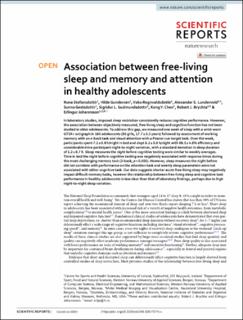| dc.contributor.author | Stefansdóttir, Runa | |
| dc.contributor.author | Gundersen, Hilde | |
| dc.contributor.author | Rögnvaldsdóttir, Vaka | |
| dc.contributor.author | Lundervold, Alexander Selvikvåg | |
| dc.contributor.author | Gestdóttir, Sunna | |
| dc.contributor.author | Gudmundsdóttir, Sigridur Lara | |
| dc.contributor.author | Chen, Kong Y. | |
| dc.contributor.author | Brychta, Robert J. | |
| dc.contributor.author | Johannsson, Erlingur | |
| dc.coverage.spatial | Iceland | en_US |
| dc.date.accessioned | 2020-12-18T08:34:40Z | |
| dc.date.available | 2020-12-18T08:34:40Z | |
| dc.date.created | 2020-10-29T10:23:52Z | |
| dc.date.issued | 2020 | |
| dc.identifier.citation | Stefansdottir, R., Gundersen, H., Rognvaldsdottir, V., Lundervold, A. S., Gestsdottir, S., Gudmundsdottir, S. L., … Johannsson, E. (2020). Association between free-living sleep and memory and attention in healthy adolescents. Scientific Reports, 10(1). | en_US |
| dc.identifier.issn | 2045-2322 | |
| dc.identifier.uri | https://hdl.handle.net/11250/2720138 | |
| dc.description.abstract | In laboratory studies, imposed sleep restriction consistently reduces cognitive performance. However, the association between objectively measured, free-living sleep and cognitive function has not been studied in older adolescents. To address this gap, we measured one week of sleep with a wrist-worn GT3X+ actigraph in 160 adolescents (96 girls, 17.7 ± 0.3 years) followed by assessment of working memory with an n-back task and visual attention with a Posner cue-target task. Over the week, participants spent 7.1 ± 0.8 h/night in bed and slept 6.2 ± 0.8 h/night with 88.5 ± 4.8% efficiency and considerable intra-participant night-to-night variation, with a standard deviation in sleep duration of 1.2 ± 0.7 h. Sleep measures the night before cognitive testing were similar to weekly averages. Time in bed the night before cognitive testing was negatively associated with response times during the most challenging memory task (3-back; p = 0.005). However, sleep measures the night before did not correlate with performance on the attention task and weekly sleep parameters were not associated with either cognitive task. Our data suggests shorter acute free-living sleep may negatively impact difficult memory tasks, however the relationship between free-living sleep and cognitive task performance in healthy adolescents is less clear than that of laboratory findings, perhaps due to high night-to-night sleep variation. | en_US |
| dc.language.iso | eng | en_US |
| dc.publisher | SpringerNature | en_US |
| dc.rights | Navngivelse 4.0 Internasjonal | * |
| dc.rights.uri | http://creativecommons.org/licenses/by/4.0/deed.no | * |
| dc.title | Association between free-living sleep and memory and attention in healthy adolescents | en_US |
| dc.type | Peer reviewed | en_US |
| dc.type | Journal article | en_US |
| dc.description.version | publishedVersion | en_US |
| dc.rights.holder | © The Author(s) 2020 | en_US |
| dc.source.pagenumber | 1-13 | en_US |
| dc.source.volume | 10 | en_US |
| dc.source.journal | Scientific Reports | en_US |
| dc.identifier.doi | 10.1038/s41598-020-73774-x | |
| dc.identifier.cristin | 1843180 | |
| dc.relation.project | RANNÍS: 152509-051 | en_US |
| dc.source.articlenumber | 16877 | en_US |
| cristin.ispublished | true | |
| cristin.fulltext | original | |
| cristin.qualitycode | 1 | |

